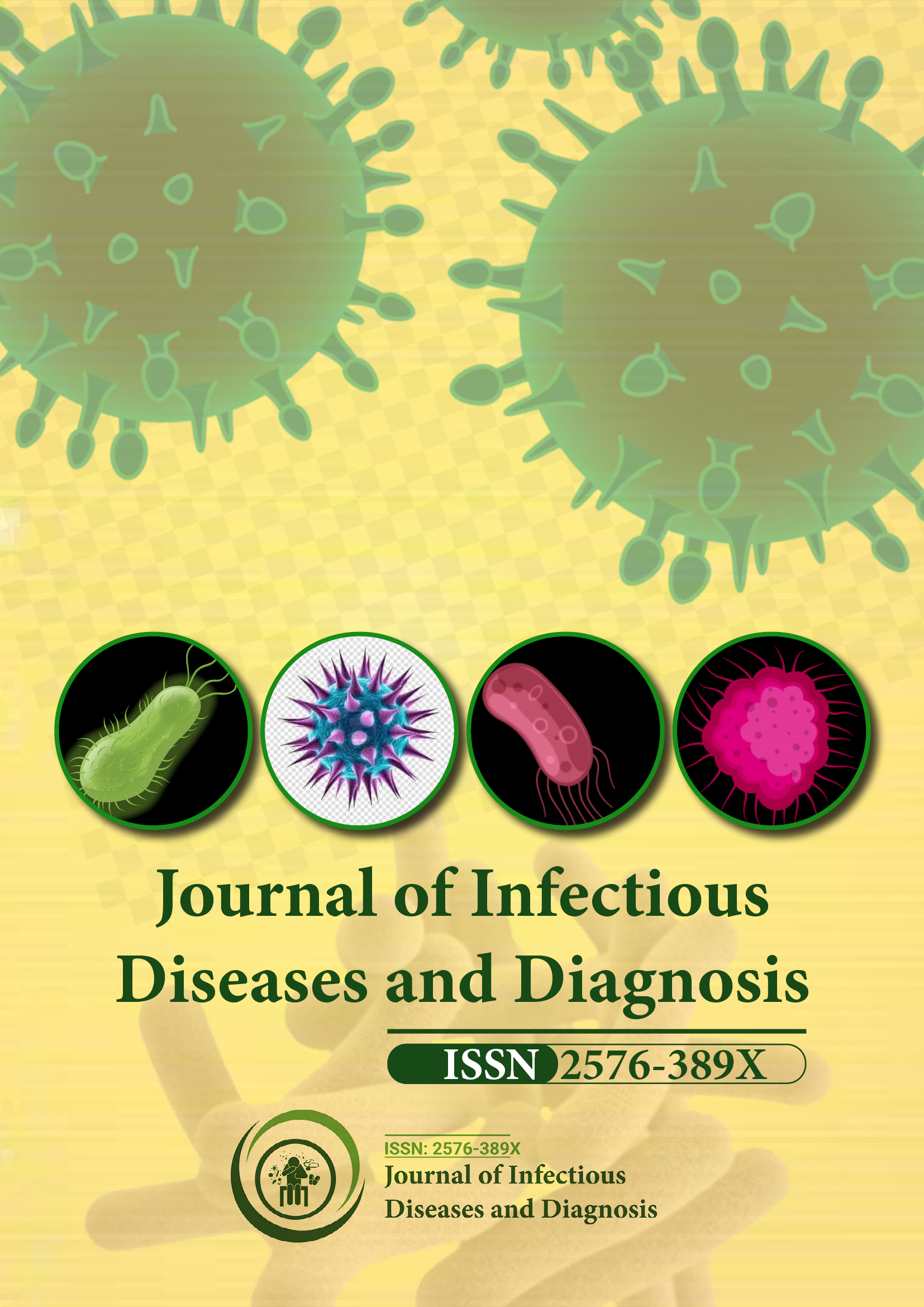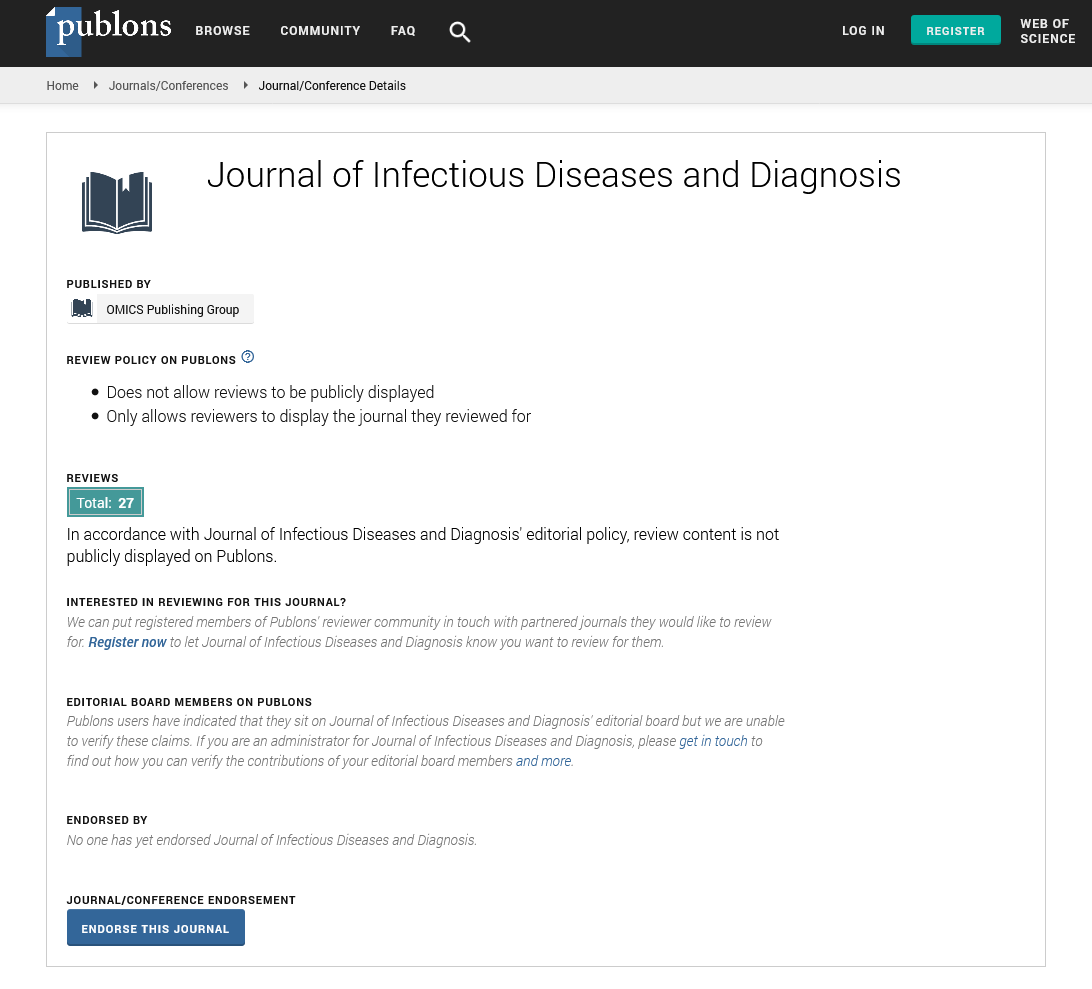Indexed In
- RefSeek
- Hamdard University
- EBSCO A-Z
- Publons
- Euro Pub
- Google Scholar
Useful Links
Share This Page
Journal Flyer

Open Access Journals
- Agri and Aquaculture
- Biochemistry
- Bioinformatics & Systems Biology
- Business & Management
- Chemistry
- Clinical Sciences
- Engineering
- Food & Nutrition
- General Science
- Genetics & Molecular Biology
- Immunology & Microbiology
- Medical Sciences
- Neuroscience & Psychology
- Nursing & Health Care
- Pharmaceutical Sciences
Editorial - (2021) Volume 6, Issue 3
Contending for Blood: How Scientists are Explaining Infectious Disease Mysteries
Fatmata Sahr*Received: 24-Sep-2021 Published: 15-Oct-2021, DOI: 10.35248/2576-389X.21.6.e111
Editorial Note
Scientists are treating malaria and worm infection to public health officials disentangle how infections contend in the human body. To examined data from an Indonesian investigation of 4,000 patients who had two parasitic infections: malaria and hookworm. To focused in on the malaria patients who additionally got deworming treatment and found obscure associations between the species. Their ecological perspective proved vital to teasing apart the data and realizing that the coinfecting species are fighting over a shared resource red blood cells. Co-infecting specialists can interact not in violation of our spending plan of the body similarly as species collaborate on the savannah, through asset rivalry predation. Biologists, contemplating species associations not in violation of our spending plan comprehensively, can reveal insight into human wellbeing. When many people consider ecology, they contemplate the food pyramid of the rainforest or the Serengeti, yet a similar asset fights that clarify lion-wildebeest-grass biological systems can apply to parasites not in violation of our spending plan body. By considering contest for red blood cells, she and her associates uncovered that removing worms from patients who also had malaria allowed their malaria to develop to almost three-crease higher densities. On the other hand, the presence of the bloodsucking worms decreased the thickness of malaria parasites by more than 50%. At the end of the day, deworming can worsen malaria contaminations, conceivably causing more extreme manifestations and expanding the danger of communicating intestinal sickness to others. Regardless of whether and how contaminations collaborate has significant ramifications for human wellbeing and sickness spread. malaria and soil-communicated worm contaminations stay two of the most well-known and co-happening sorts of human infectious diseases.
The immunologists were looking from a hierarchical view, focusing on how the immune system attacked the various parasites. That resembles checking out the Serengeti and thinking lions decide the populaces of herbivores like zebras and wildebeests. That is true sometimes however more frequently, the two hunters and food accessibility are significant. Malaria parasites are naturally in a comparative situation to those herbivores. They're relying upon assets underneath them on the natural way of life for herbivores it's the vegetation, for intestinal sickness parasites it's the red platelets and afterward every one of them are dependent upon predation from a higher place. For herbivores it's hunters like lions, for parasites it's the immune system. Worms are in a similar situation in the evolved way of life: they are in danger from immunological hunters, and hookworms eat red blood cells (however different worms rather eat food not in excess of our spending plan's gut). The more extensive ramifications of this work is hence in its advancement of natural reasoning and approaches in the field of medical research. Just like different animals, some infection causing species are preferred contenders over others. The bloodsucking hookworms outcompete one types of malaria, Plasmodium vivax. Strangely, different types of malaria, P. falciparum, can outcompete hookworms, especially when they are recently infecting a previously dewormed individual. Not really set in stone that the distinction in the response to deworming is a component of how exacting the malaria species are. In the event that the hookworms are decreasing the quantity of red blood that are near, the vivax, which is pickier in which red blood it can utilize, simply needs more to recreate as fast. But the falciparum, which use any red blood cell around, can find enough red blood cells to replicate.
Citation: Sahr F (2021) Contending for Blood: How Scientists are Explaining Infectious Disease Mysteries. J Infect Dis Diagn.6:e111.
Copyright: © 2021 Sahr F. This is an open-access article distributed under the terms of the Creative Commons Attribution License, which permits unrestricted use, distribution, and reproduction in any medium, provided the original author and source are credited.

